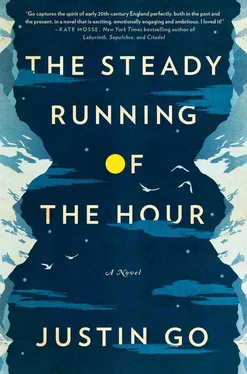Imogen was peeling turnips with a paring knife, intending to mash them with butter and cream in the Swedish fashion. At once Eleanor realized her mistake, but it was already too late. Imogen looked at her sister.
— Names?
— For the baby. They were just ideas—
— Which names?
Eleanor hesitated. — If you really want to know, I wonder what you think of Frederick for a boy, or Charlotte for a girl. They’re ordinary names, of course, but Charles says ordinary—
It was then that Imogen cut her index finger on the blade, drawing a thin stream of crimson blood that dripped over the turnips and the cutting board. Afterward there had been a quarrel. But Imogen’s real passion seemed to have evaporated, for as they argued she felt herself rehearsing a role she no longer believed in. In the end Eleanor simply came to the point.
— Imogen, she pleaded, just tell me what you’re going to do.
Imogen said nothing. But as Eleanor looked at her sister across the dining table she knew the truth at once, for resignation was so unlike Imogen that she wore it very peculiarly. The sisters ate dinner in silence. Eleanor had not mentioned the child since.
Imogen pauses halfway down the field. She takes off her gloves, bending at her knees to pick up a handful of snow. It is fresh snow, light and dry against her mittens. She packs it into a tight snowball, adding more powder until it is dense and solid, no larger than a cricket ball. She throws the snowball toward the trees and watches it sail through the air until she loses sight of it among a field of white. Imogen walks on.
Naturally Eleanor was right to choose the names, to have them chosen already. Imogen recognized this. For what would the child know of its true parents, of their tangle of embrace and loss? Nothing at all. The child would grow up in the carefully ordered bohemia of Charles and Eleanor’s home, the study with its fashionable books on the shelves, the sitting room furnished with the right chairs or textiles from the Omega Workshops, and all reckless imagination relegated to the tidy painting studio upstairs.
It would be nothing like the home that Ashley and Imogen might have shared, the chaos of Imogen’s clutter — parasols and baskets covering half the surfaces; bouquets of wilting flowers gathered from city parks; tables drowning in leaflets on women’s suffrage or vegetarianism or Fabianism, inscribed in ink with some chance thought Imogen had wished to record. The furnishings themselves would all be Ashley’s things, for she had none of her own. Framed photographs of Alpine peaks, Imogen supposed, or odd pairings of books, the Negretti & Zambra catalog on the shelf beside ten disintegrating volumes of The Thousand and One Nights held together with twine. She had pictured it often, and perhaps Ashley had too, but they had never had the pleasure of picturing of it together.
— Ashley, she whispers.
He was, perhaps, not at all extraordinary. Nor was he the lover she had imagined her whole long girlhood. Could one even call him a romantic? Imogen doubts it. His passion was concealed beneath so many layers of opaque humor and roguishness that it was often impossible to detect. As a lover Ashley seemed too hesitant to Imogen, almost timid, until the point at which he forced himself to make the most foolhardy leaps. It was only this strange resolve that made Ashley extraordinary, but Imogen believed that however devoted he was to her, he had now given himself to the war at least as much, in a bargain he had made long before he could have any notion of its cost. Perhaps Ashley regretted this choice, but the bond felt too strong for Imogen to sever, for she sensed Ashley had lost something he could not get back — not so simple as the skin on his neck or the sound of his old voice, but something finer and dearer, a loss Imogen could probably never understand. There were countless men who returned to England unrecognizable to those who had loved them, but Imogen had never believed Ashley would become one of those men, just as she could not imagine herself under a dark veil, wearing a necklace of dull black beads. Those were for other women, the women who adhered to the rules. Imogen had thought that none of those rules applied to them, but now she feared that all of them did, for she finally accepted that Ashley was only a man and she was only a woman, and all the things they meant to each other could not protect them.
And yet their love had been different. Together they had been more than their discrete selves, and the force and strength of that attraction had lent them something mythical, a week so ardent and vivid that they alone were privy to the world’s secret marvels. The colors and shapes, the sounds and scents of London and Sutton Courtenay, the hotel, the train station — it had all been sculpted by the gravity of their attraction, distorted as rays cast through a prism. Or had the prism only focused things, made her see them as they were, for one singular moment? Imogen cannot say. She knows only that it eclipsed all she had known before or ever would know.
If only she had recognized this at the time — how she wishes she could have loved him even more. How she could have savored that perfect interlude, that shimmering gem of one week among the slag-heap of decades that would be her life. But that was youth, she thought, and that was love. It was blindness that made it so. She will not meet that blaze again, not with Ashley or anyone else, nor will she waste her life searching for its sequel. There was no sequel. That was what made it extraordinary. That intensity of feeling was locked in her past now, the same as her first teetering steps or first immersion in the dazzling ocean. If she looks for anything in her future, she will have to look for something else.
Imogen reaches the trees now, taking a seat on a toppled pine and crossing her legs at the ankles. She rests her hands lightly upon her stomach. She has only five months to go, and then it will all be over. She must take solace in that, at least: it will be over then.
She had tried to write him a proper letter. There had been leaves of foolscap everywhere to prove it, and though Eleanor said nothing, she must have seen those sheets with his name on the first page, also the later ones where Imogen omitted the name, resolving to add it only when the letter was completed. But the letters were never completed, no matter how long they went. Imogen found it impossible to explain the condition she was in, impossible to reconcile what she wished to say with the fact of their separation.
She could say that to live life her own way was all she knew how to do, and it was unfair to demand that Ashley act any differently, whatever the consequences. She could explain that she was not surrendering any longer, that she had finally chosen her path and in five months she would be accountable only to herself, for she understood now that she could not bear the terrible responsibility of other people’s happiness.
But Imogen could not send those sheets. To Ashley it would all be whitewash and she knew it. She had burned the pages this morning.
They shall not meet again. That is the lone fact and there is nothing to say about it. It is beastly. Imogen refuses to parley with that fact, nor explain it, nor soften it or render some pitiful apology. She had tried to do all those things and failed, and the proof of these efforts were the ashes in the fireplace, the letters of grand intent and great affection that would have kindled Ashley’s every hope, only to collapse on the final page to the world as it was. The world distilled to the three sentences she had given Eleanor.
My Ashley —
I’ve lost the child. I’m going away and I cannot see you again. I’m so very sorry.
I remain — your loving
Читать дальше












